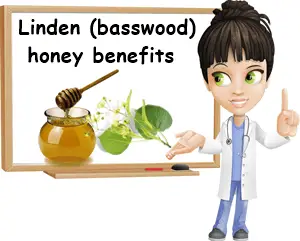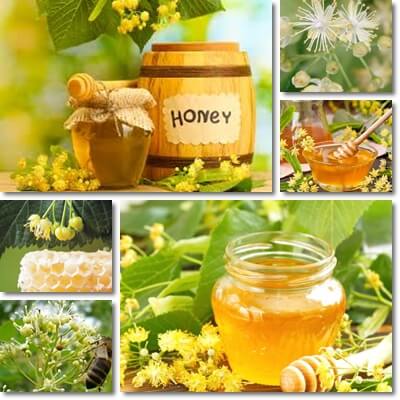Linden honey, also called basswood or lime honey, is a variety of honey made from the flower nectar and pollen of linden flowers. Linden or basswood refers to about thirty tree species in the Tilia genus, all of which are nectar-producing and may serve as food for honey bees. The resulting honey is a high-quality monofloral variety with a medium taste intensity, a rich flavor profile and a number of health benefits, including a natural antibacterial action, antioxidant, tonic and liver protective properties, mild cough-suppressing and expectorant effects.
Why the different names?
Why is it called linden honey, basswood honey and lime honey? The honey is called just as the tree species is in different parts of the world. For example, in Europe, the trees are commonly called linden, so the honey is also called linden honey. In Great Britain and its surrounding islands, linden trees are commonly known as lime trees, so the honey is also known as lime honey, but is not the same as the lime honey made from the flower nectar of the citrus fruit. Throughout North America, the popular name for the tree is often basswood, hence the reason why the honey produced from its flower nectar is labeled basswood honey.

Linden honey and allergy
Like all honeys, linden too can cause an allergic reaction. If you are allergic to linden pollen, then you are advised to avoid the honey and other products that may contain pollen from the species. If you are not allergic to linden pollen, but are to honey bees and the enzymes they produce to make the honey, then you are advised to avoid both linden and all honey varieties and other honey bee products (example: bee bread, royal jelly). Multiple pollen allergies increase one’s risk of other pollen allergies, while multiple food allergies increase one’s risk of having other allergies as well.
What does linden (basswood) honey look like?
Linden is a light-colored honey. Upon harvesting, it has a beautiful light amber color with rich greenish reflexes, but the color changes as time passes, becoming a clear, pale yellow or a very light, whitish yellow. As it crystallizes, it takes on a paler, opaque, light yellow color.
What does linden (basswood) honey taste and smell like?
The honey is light, fragrant, pleasantly sweet, but with a barely perceptible bitter aftertaste and a slight astringency. Its flavor profile is rich and includes balsamic, menthol and minty, hay or light woody notes. It’s not particularly acidic, but decidedly sweet and has a medium-fast crystallization time. A fresh linden honey often begins to crystallize about 4 months after harvest. While at first it’s liquid, as it matures it takes on a thicker consistency.
Learn more about the benefits of crystallized honey.

What are the benefits of linden honey?
What is linden (basswood) honey good for? Here are 9 impressive uses, properties and health benefits of linden, basswood or lime honey for digestive, respiratory, skin and immune system health:
Natural antibacterial
For the most part, the antibacterial properties of linden honey are a result of its content of a natural antimicrobial called hydrogen peroxide, which reduces bacteria growth. The low moisture content and acidic pH of the honey also help stop bacteria growth at the site of the infection, further contributing to its antibacterial action, but also calming effect. Pollen helps boost the immune system response.
Honey in general is most effective when in direct contact with bacterial agents and irritated mucous membranes which explains why it is eaten to help treat respiratory infections such as colds, flu, laryngitis, pharyngitis or rhinitis and their symptoms.
Good for sore throat and cough
Linden honey is especially good for cough and sore throat, common symptoms of a variety of respiratory tract infections. Its viscous consistency helps the honey stick to the throat lining, forming a sort of protective coating that prevents further irritation and allows it to heal. This also helps suppress the cough reflex, helping calm cough. The antibacterial properties actively contribute to fighting off the infection, by either stopping its spread or reducing bacteria numbers. But for linden or any other types of honey to be effective, it is important to avoid processing and heating, both of which affect their beneficial properties, potentially rendering the honey ineffective.
Helps get rid of phlegm
Linden honey may help get rid of phlegm in the throat because of its mildly astringent properties which contribute to breaking down the sticky mucus, helping dislocate it. This should helps us eliminate it by coughing it up. Warm linden tea can help get rid of mucus in the nose as well.
Source of vitamins and antioxidants
All honey varieties contain very small amounts of essential nutrients such as vitamins, dietary minerals and amino acids, but also antioxidants. Linden has vitamin C, B vitamins, potassium, calcium, magnesium, manganese, phosphorus zinc, but also antioxidant polyphenols, flavonoids and even tannins and some essential oils with antioxidant effects. All of these elements are what makes linden honey healthy.
Energizing effects
Linden and all honeys hold natural tonic properties, helping raise energy levels and improve mood and even appetite. Such effects are believed to be a result of the natural sugars and other nutrients found in the honey (amino acids, pollen etc.). For me, linden honey is a great help for hypoglycemia because it restores good energy levels quickly, giving me the time and strength to prepare a good meal.
Hepatoprotective properties
Linden flowers have been traditionally used in various preparations for promoting liver health and, now, the honey derived from their nectar is said to have similar properties. The honey is said to encourage the release of bile, helping with good liver function and thus contributing to liver health. By maintaining a healthy liver, capable of detoxifying the body of toxins, linden honey is awarded the attribute of natural hepatoprotective.
Soothing action on the stomach
Because of its physical characteristics (naturally thick consistency and low moisture content) and beneficial antibacterial properties, linden honey has a soothing, calming action. People often eat a tablespoon of raw, unprocessed linden honey on an empty stomach in the morning to relieve stomach discomfort, improve digestion and relieve stomach irritation caused by gastritis. The honey is also eaten for treating stomach ulcers. The naturally thick consistency and antibacterial properties of the honey are what make it a good complementary approach in gastritis treatment.
Prebiotic benefits, good for gut bacteria
It has been shown that the natural sugars in the honey have a prebiotic effect, feeding the good bacteria and other types of flora in our digestive system, which helps improve digestion and works towards maintaining a gut environment that is conducive to good overall health. Additional benefits: potential for relieving constipation. Linden honey is also a cholagogue, meaning it stimulates the flow of bile which has benefits for digestion.
Great for skin care
Applied on the skin, linden honey can help calm irritation and redness and even reduce acne breakouts. Used as a face mask, it unclogs pores, reduces blackheads, softens skin and makes it look radiant, giving it a beautiful glow. In my experience, light-colored honeys like linden also help with uneven skin tone.
Other uses of linden honey
Other potential uses: in hypertension, for lowering high blood pressure numbers. Preparations from linden flowers such as linden flower tea have blood pressure-lowering effects. It has been suggested that the honey too may have such benefits as well considering that certain active properties from the plant flowers are imparted to the honey. In any case, considering the chemical composition of the honey, such effects would be mild at most.
Conclusion
For the best flavor and best benefits, linden honey is best consumed raw, unheated and unprocessed. Heat destroys its beneficial properties and renders it ineffective. This is why it is recommended to wait until our tea has cooled down to sweeten it with honey and eat raw honey on bread, in smoothies, with fruit instead of cooking with it. It’s also important to always choose natural, organic linden honey from brands with a reputation of clean and responsible honey production.
